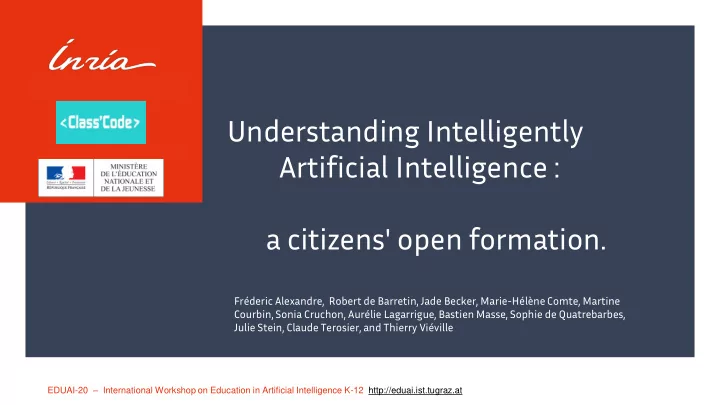

en partenariat avec Understanding Intelligently et avec le soutien de Artificial Intelligence : a citizens' open formation. Fréderic Alexandre, Robert de Barretin, Jade Becker, Marie-Hélène Comte, Martine Courbin, Sonia Cruchon, Aurélie Lagarrigue, Bastien Masse, Sophie de Quatrebarbes, Julie Stein, Claude Terosier, and Thierry Viéville EDUAI-20 – International Workshop on Education in Artificial Intelligence K-12 http://eduai.ist.tugraz.at
Contents 01. What for ? Context and objectives 02. What about ? The AI for citizen key notions 03. How to ? Method and production 04. So what ? First results and Analysis 05. What’s next ? Conclusion and perspective 2 -
01. What for ? Context and objectives Understand the how-to of AI science to master AI technology ● Digital science deeply impact our whole society, AI induces a disruptive change > Being a “user” means be subjected to whom creates digital objects > Everyone must be able to choose, co-construct, accept or deny h(er|is) usage ● Now (at last !) our children start learning computational thinking > At school : creative programming, unplugged computer science, … > Beyond : ludic robotics, maker activities, internet mastering • Let’s STEAM including AI ! 3 -
02a. What about ? The key notions AI is “the science of making machines do things that would require intelligence if done by [human]” (Marvin Minsky 1968). ● Very efficient information processing but without “understanding a word” ● Need as much as possible specific à- priori information, no “free - lunch” ● Programming paradigm : designing architecture and feeding data ● Both symbolic knowledge representation and numeric approximation ● Change our vision of natural (i.e., biological) intelligence, intentionality, … ● Induce disruptive (not so visible) change in our society 4 -
02b. What about ? The key notions ● What is artificial intelligence? … and what it is not. > #historical-aspects #machine-animal-human-intelligence #numeric-versus-symbolic #knowledge-formalization #numeric-representation #critical-thinking ● How to do artificial intelligence? … machine learning. > #data-programming #understand-the-basis #abscons-words- demystified #discovering-by-doing ● Artificial intelligence at our service? … issues and levers, in order AI to really be at the service of people. > #beyond-myths-or-rhetoric manipulation #what-is-already- here #what-could-happen-(or-likely-not) #applications-with-AI https://classcode.fr/iai 5 -
03. How to ? Method and production A MOOC and modular resources • Open and reusable resources (video, text, applet) Auto evaluation Free attestation + Quiz • Concrete activities + Activity result quantification (online and unplugged) + Real-life actions to learn by doing • Forum to * On line “rendez - vous” Contribution to K12 - Ad-hoc explanation * Event participation teaching resources - Peer to peer discussions (before march and soon ;) ) and formation - Formation improvement 6 -
04a. So what ? First results and Analysis ● FUN platform data (begging of July) : > more than 13000 inscriptions (36% female, 63% male, 1% not binary) (32% under 35 years, 44% between 36 and 55, 24% above 56) > more 1600 persons enjoying at least one module > 600 attestations of success after 2 months ● Inria Learning Lab questionnaire : > Above 90% of person having their expectation satisfied (43% fully satisfied) Source : questionnaire - Inria Learning Lab - 200 answers, beginning of July 7 -
04b. So what ? First results and Analysis ● Who is who ? > mainly active (52% on activity, 14% retired, 12% students, 8% job researcher) > mostly with university level (77% at least bachelors in any field, 10% PhD) > rather beginners in the field (58% full beginners, 38% intermediate non expert) ● How much work ? > working 10 to 20 hours in average (about 50% of the persons spend from 2 up to 5 hours per week, during about 3 weeks, while 25% spend less and 25% more) 8 -
04c. So what ? First results and Analysis ● Forum activity : > more than 1500 persons have been or are active while > more than 3500 are reading the about 200 discussions, > more than half of the transactions being on the course contents (e.g., strong versus weak AI, symbolic versus numeric methods, societal issues, …). ● Hybrid activities : > more than 10 online hangouts of 30 to 200 persons during confinement > participation in the “educatec/educatice” main French event before > more to come … 9 -
05. What’s next ? Conclusion, perspective ● What is still needed > extend the existing formation with more operational tutorials, > manage some technical weakness (recent external resources to be consolidated) > complete the existing contents to better help the learner progression > offers links towards “next level” initiation in machine learning ● With respect to other offers > Not only talking about IA but a real maker approach > Less technical than the (e.g., Finish) best offers (e.g., no python programming , but still using real or toy AI platforms) Towards an “ ubiquitary citizen university in digital science and culture ” 10 -
Acknowledgements: The Digital Direction for Education of the French Ministry, the French Digital University Engineering and Technology, Microsoft, EducAzur, La Compagnie du Code, LINE laboratory, and all Class´Code partners. 04/06/2019 11 -
Recommend
More recommend